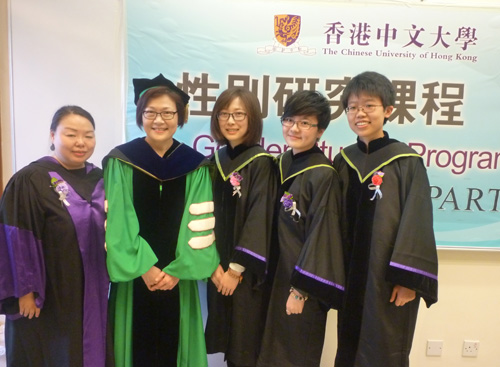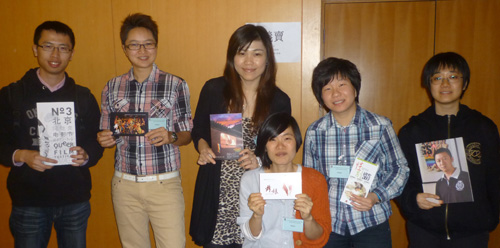 The Gender Studies Programme at the Chinese University of Hong Kong is the first programme on gender studies in tertiary education in Hong Kong. Established in 1997, the Gender Studies Programme is interdisciplinary in nature, with expertise drawn from different academic departments such as psychology, sociology, cultural studies, anthropology, social work, translation, history and linguistics. It offers coursework and research opportunities with an inter-disciplinary team of faculty members. It provides students with a broad-based education in traditional academic disciplines while specializing in gender studies. We are dedicated to promote awareness and interest in gender and sexuality issues on campus, in schools, and in the wider society.
The Gender Studies Programme at the Chinese University of Hong Kong is the first programme on gender studies in tertiary education in Hong Kong. Established in 1997, the Gender Studies Programme is interdisciplinary in nature, with expertise drawn from different academic departments such as psychology, sociology, cultural studies, anthropology, social work, translation, history and linguistics. It offers coursework and research opportunities with an inter-disciplinary team of faculty members. It provides students with a broad-based education in traditional academic disciplines while specializing in gender studies. We are dedicated to promote awareness and interest in gender and sexuality issues on campus, in schools, and in the wider society.
 The Gender Studies Programme started an undergraduate minor programme in 1997/98, and an MPhil programme in Gender Studies in the following year. Since 2002/03, we took in PhD students. We also started an MA Programme in Gender Studies (previously named “Women Studies”) in the same year. For two years, 2002-2004, we also offered a series of courses for a Postgraduate Diploma in Women’s Studies, held in Beijing, for mainland scholars and professionals working in the area of gender and family. This was done in collaboration with the University of Michigan and the Chinese Women’s College, and fully funded by the Henry Luce Foundation. In 2015/16, BSSc in Gender Studies, the first undergraduate programme of this subject area in Hong Kong, admitted the first cohort of enthusiastic students.
The Gender Studies Programme started an undergraduate minor programme in 1997/98, and an MPhil programme in Gender Studies in the following year. Since 2002/03, we took in PhD students. We also started an MA Programme in Gender Studies (previously named “Women Studies”) in the same year. For two years, 2002-2004, we also offered a series of courses for a Postgraduate Diploma in Women’s Studies, held in Beijing, for mainland scholars and professionals working in the area of gender and family. This was done in collaboration with the University of Michigan and the Chinese Women’s College, and fully funded by the Henry Luce Foundation. In 2015/16, BSSc in Gender Studies, the first undergraduate programme of this subject area in Hong Kong, admitted the first cohort of enthusiastic students.
Apart from teaching and research, our Programme also works to generate greater interest in gender studies in both the academia and the wider society. Starting from 2004, we have invited internationally well-known scholars to come as Visiting Scholars. Coming for one week, these scholars give public lectures and conduct roundtable discussions with our faculty and graduate students. Apart from this, we run a lunch-time seminar series each term. For the past few years, this has drawn a wide audience not only from the university community, but also from NGOs and members of the public. Furthermore, our MA and research students have shown great initiative in applying what they have learned to public education. One example of their endeavours is a week-long festival on gender and sexuality, which featured several public forums, film shows as well as workshops for secondary students and teachers. In 2006, our research students launched a newsletter on gender and sexuality, and this has now gained a wide circulation in local schools.



